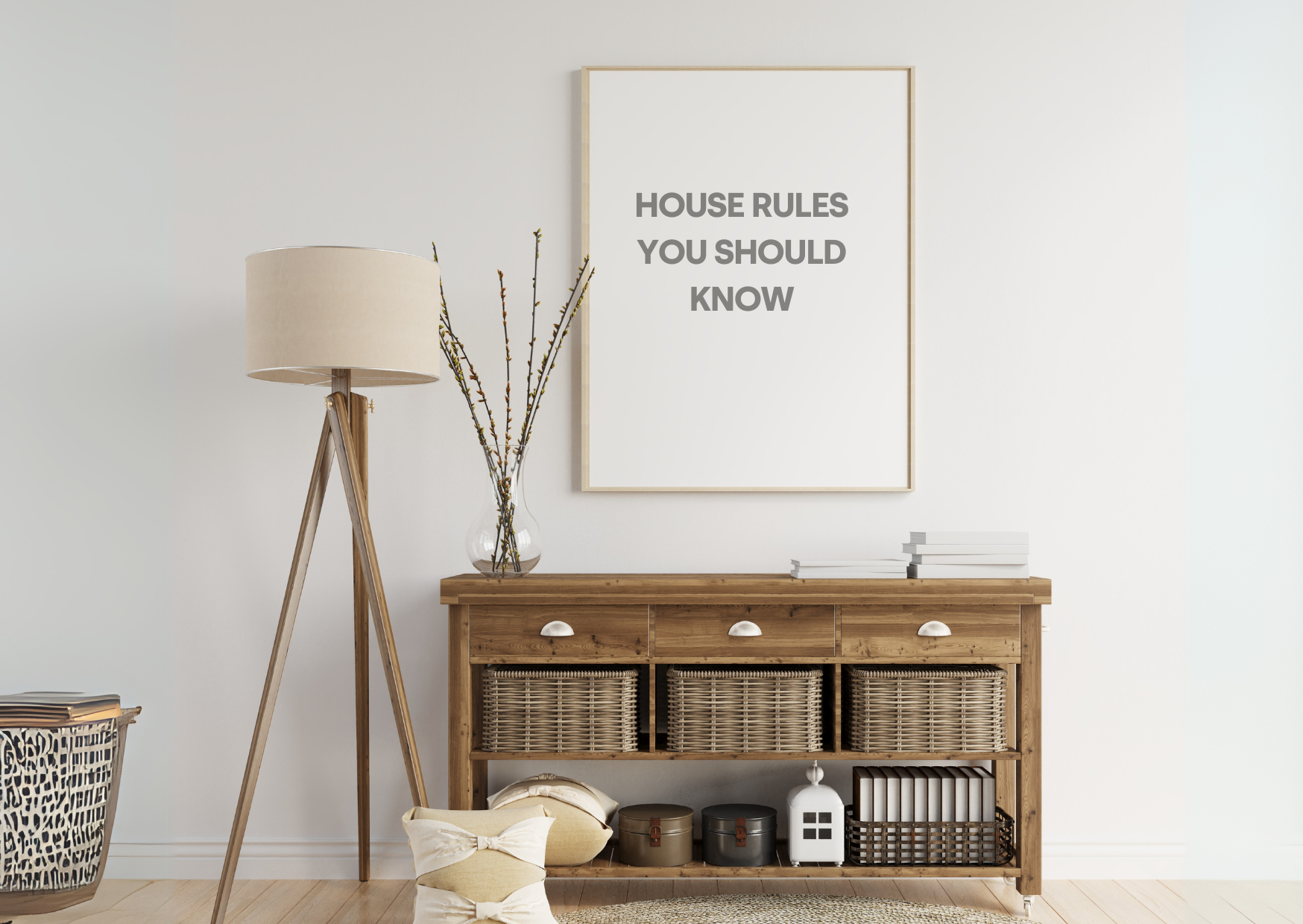Hosting on Airbnb is more than just providing a comfortable place to stay; it’s about setting the right expectations to create a hassle-free experience for both you and your guests. Clear and well-communicated house rules help protect your property, prevent misunderstandings, and ensure a smooth stay for everyone involved.
By establishing firm yet fair rules, you’ll minimize issues such as noise complaints, property damage, and unexpected guests. In this guide, we’ll explore six essential Airbnb house rules that every host should include in their listing to maintain order and create a positive guest experience.
Check-In and Check-Out Times
First impressions matter, and a smooth check-in process can set the tone for a great guest experience.
Clearly defining check-in and check-out times is crucial to avoid scheduling conflicts and ensure that your cleaning team has enough time to prepare the property for the next guests. Make sure to specify:
- Check-in time: When guests can arrive and access the property.
- Check-out time: The latest time guests should vacate the premises.
- Late check-out fees: If applicable, outline any penalties for overstaying.
If you offer self-check-in, provide detailed instructions in advance, including keyless entry codes, lockbox locations, and Wi-Fi information. Clearly state if there are additional steps, such as verifying identity before sending check-in details.
For guests requesting early check-in or late check-out, clarify in advance if these options are available and whether additional fees apply. Some hosts charge an extra fee for extended stays, while others may accommodate requests based on availability.
Pro Tip: Include a reminder in your automated messages before check-out to encourage timely departures and prevent delays for the next guests. A friendly message the night before can help guests plan accordingly.
Smoking Policies
Smoking indoors can leave lingering odors, cause damage to furniture, and create a fire hazard. If you want to maintain a fresh and welcoming environment, a strict no-smoking rule inside the home is essential.
Some key points to include are:
- No smoking inside the property, including e-cigarettes and vaping devices.
- Smoking is only allowed in designated outdoor areas, and cigarette butts must be disposed of properly.
- Consequences for violating the smoking policy, such as additional cleaning fees.
Make sure to clearly indicate designated smoking areas (if any) to avoid confusion. If your property is entirely smoke-free, reinforce this rule in multiple places, such as your listing description, house manual, and pre-arrival messages.
Some hosts go a step further by using air quality monitors that detect smoke particles, ensuring compliance without invading guest privacy
Visitor and Party Limitations
Airbnb has strict policies regarding unauthorized parties, and violations can lead to penalties or even removal from the platform. To protect your property and ensure a peaceful stay for your neighbors, set clear boundaries on guests and visitors.
Example guidelines:
- Only registered guests are allowed to stay overnight.
- Visitors are allowed but must be approved in advance.
- Parties, large gatherings, and events are strictly prohibited.
- Maximum occupancy: [Insert Number].
To enforce these rules, consider using security measures like smart locks that only grant access to registered guests or exterior security cameras (placed in compliance with Airbnb’s privacy policies). Airbnb’s “no-party policy” also helps hosts enforce these rules by flagging high-risk bookings, such as same-day reservations from local guests.
Pro Tip: Politely but firmly remind guests of visitor policies in pre-check-in messages, and include consequences for violations, such as immediate cancellation without refund.
How to Prevent Unapproved Parties in Your Rental
Preventing unauthorized parties is crucial for protecting your property and maintaining good relationships with neighbors. Here are a few proactive steps you can take:
- Set strict occupancy limits in your listing and require guests to confirm these rules before booking.
- Use Airbnb’s reservation screening tools, which help detect high-risk bookings, such as local guests making last-minute weekend reservations.
- Install noise monitoring devices like Minut or NoiseAware, which alert you to excessive noise without invading guest privacy.
- Require a security deposit, which can deter guests from breaking the rules.
- Specify clear consequences for rule violations, such as immediate termination of the reservation without a refund.
By implementing these measures, you can significantly reduce the likelihood of unauthorized gatherings and protect your property from damage
Noise Restrictions
Excessive noise is one of the top complaints from neighbors and other tenants. Setting clear quiet hours ensures that your Airbnb maintains a positive reputation in the community and avoids potential fines from homeowner associations or local regulations.
- Quiet hours are from 10:00 PM to 8:00 AM.
- Please keep music and TV volume at a reasonable level at all times.
- No loud gatherings or disruptive behavior at any time.
For added security, noise monitoring devices like Minut or NoiseAware (which measure decibel levels without recording conversations) can help detect excessive noise while respecting guest privacy. These tools automatically alert you if noise levels exceed a set threshold, allowing you to address the issue before it escalates.
Pro Tip: Politely remind guests of quiet hours in your house manual and pre-stay message. If your Airbnb is in a residential area, emphasize the importance of respecting neighbors.
H3: How to Set Quiet Hours to Prevent Disturbances
To ensure your guests respect quiet hours, consider the following approaches:
- Highlight quiet hours in your listing, pre-arrival messages, and house manual.
- Use gentle but firm language to emphasize community respect.
- Post signage in key areas of the home as reminders.
- Use smart home technology, such as automated light dimmers, to signal nighttime hours.
- If issues arise, communicate with guests through Airbnb’s messaging system first before escalating.
A proactive approach helps guests stay mindful of noise levels, reducing potential disturbances.
Cleaning and Trash Disposal
While guests don’t need to deep clean the space, setting basic cleaning expectations ensures your property stays in great condition between stays. Avoid surprises by clearly outlining their responsibilities before check-out.
- Please wash any used dishes before check-out.
- Dispose of trash and recycling in the designated bins.
- Leave used towels in the laundry basket.
If you expect guests to strip the bed, take out the trash, or start the dishwasher, be explicit in your instructions. Some hosts include a checklist in their house manual to streamline the process.
To prevent excessive mess, you can charge an additional cleaning fee if the home is left in an unreasonably dirty state. Make sure to document this rule in your listing and clarify what constitutes “excessive cleaning.”
Pro Tip: Provide clear signage for recycling and trash disposal to ensure guests follow your waste management system. Consider offering cleaning supplies like disinfectant wipes to encourage tidiness.
Pet Policies
If you allow pets, make sure to include specific rules to ensure responsible pet ownership. Some hosts charge a pet fee or restrict pets to certain areas of the home to minimize damage.
- Pets must be house-trained and well-behaved.
- Pets are not allowed on furniture or beds.
- Guests must clean up after their pets immediately.
- A non-refundable pet fee of $50 applies.
If you do not allow pets, be clear in your listing: “No pets allowed.” However, keep in mind that Airbnb requires hosts to accommodate service animals in compliance with their policy.
For those who allow pets, consider providing pet-friendly amenities such as a pet bed, food bowls, or waste bags to enhance your listing’s appeal to pet owners.
Pro Tip: Establish a refundable pet deposit to cover potential damages and inspect the property thoroughly after pet stays.
How to Specify Rules for Guests
A well-structured house rules policy not only protects your property but also enhances the guest experience by setting clear expectations. By implementing these six essential rules, you’ll reduce potential issues, maintain a smooth hosting experience, and keep your Airbnb business thriving.
Looking to streamline your Airbnb management? Hostify offers automation tools for messaging, guest communication, and compliance with house rules—helping you save time and stay in control.
Want to make sure your guests follow the rules effortlessly? Download our comprehensive Airbnb House Rules checklist and keep your rental running smoothly.
FAQ
 Hostify is Now a Booking.com Premier Partner! 👉 Learn more
Hostify is Now a Booking.com Premier Partner! 👉 Learn more








